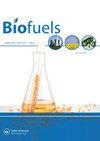Recent advancement in thermochemical conversion of biomass to biofuel
IF 2.6
4区 工程技术
Q3 ENERGY & FUELS
引用次数: 0
Abstract
AbstractBiofuel’s carbon neutrality possesses great potential in decarbonizing existing fossil fuels dependency. Biofuel can be produced from various low-cost and renewable wastes including agricultural residues and sewage sludge, through various methods like thermochemical and biological pathways, producing solid, liquid, or gaseous biofuels. Among the two, thermochemical methods offer significantly shorter reaction time and higher versatility toward feedstocks as compared to the biological route. Though, there are challenges caused by the biomass heterogeneity and low biofuel quality in thermochemical conversion methods. Hence, this review aims to discuss recent advancements of thermochemical conversion technologies of biomass to biofuel, including torrefaction, pyrolysis, transesterification, hydrothermal processing, and gasification. The challenges encountered in the thermochemical conversion methods are discussed and attempts made in resolving it are also reported. Furthermore, potentials of solid, liquid, and gaseous biofuels are also presented in terms of biomass resources availability, and applications in industry and transportation sectors. Overall, sustainable production and utilisation of biofuels are one highly potential alternative towards a net zero carbon future.Keywords: Biofuelbiomasscarbon neutralitythermochemical conversionwastes Competing interestThe authors declare no competing interest.Data availabilityNo datasets were generated or analysed during the current study.Disclosure statementNo potential conflict of interest was reported by the authors.Additional informationFundingThis work was supported by the Ministry of Higher Education, Malaysia under the HICoE research grant (cost centre: 015ME0-014).生物质热化学转化为生物燃料的最新进展
摘要生物燃料的碳中性在减少对化石燃料的依赖方面具有巨大的潜力。生物燃料可以从各种低成本和可再生的废物中生产,包括农业残留物和污水污泥,通过各种方法,如热化学和生物途径,生产固体、液体或气体生物燃料。其中,与生物途径相比,热化学方法提供了明显更短的反应时间和更高的多功能性。然而,生物质的异质性和生物燃料的低质量给热化学转化方法带来了挑战。因此,本文综述了生物质转化为生物燃料的热化学转化技术的最新进展,包括焙烧、热解、酯交换、水热处理和气化。讨论了热化学转化方法中遇到的挑战,并报道了为解决这些挑战所作的尝试。此外,固体、液体和气体生物燃料的潜力也在生物质资源的可用性以及在工业和运输部门的应用方面进行了介绍。总体而言,生物燃料的可持续生产和利用是实现净零碳未来的一个极具潜力的替代方案。关键词:生物燃料生物质碳中性热化学转化废弃物竞争利益作者声明无竞争利益。数据可用性本研究未生成或分析任何数据集。披露声明作者未报告潜在的利益冲突。本研究由马来西亚高等教育部HICoE研究基金(成本中心:015ME0-014)资助。
本文章由计算机程序翻译,如有差异,请以英文原文为准。
求助全文
约1分钟内获得全文
求助全文
来源期刊

Biofuels-Uk
Energy-Renewable Energy, Sustainability and the Environment
CiteScore
5.40
自引率
9.50%
发文量
56
期刊介绍:
Current energy systems need a vast transformation to meet the key demands of the 21st century: reduced environmental impact, economic viability and efficiency. An essential part of this energy revolution is bioenergy.
The movement towards widespread implementation of first generation biofuels is still in its infancy, requiring continued evaluation and improvement to be fully realised. Problems with current bioenergy strategies, for example competition over land use for food crops, do not yet have satisfactory solutions. The second generation of biofuels, based around cellulosic ethanol, are now in development and are opening up new possibilities for future energy generation. Recent advances in genetics have pioneered research into designer fuels and sources such as algae have been revealed as untapped bioenergy resources.
As global energy requirements change and grow, it is crucial that all aspects of the bioenergy production process are streamlined and improved, from the design of more efficient biorefineries to research into biohydrogen as an energy carrier. Current energy infrastructures need to be adapted and changed to fulfil the promises of biomass for power generation.
Biofuels provides a forum for all stakeholders in the bioenergy sector, featuring review articles, original research, commentaries, news, research and development spotlights, interviews with key opinion leaders and much more, with a view to establishing an international community of bioenergy communication.
As biofuel research continues at an unprecedented rate, the development of new feedstocks and improvements in bioenergy production processes provide the key to the transformation of biomass into a global energy resource. With the twin threats of climate change and depleted fossil fuel reserves looming, it is vitally important that research communities are mobilized to fully realize the potential of bioenergy.
 求助内容:
求助内容: 应助结果提醒方式:
应助结果提醒方式:


